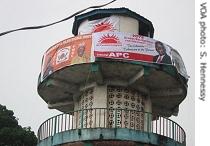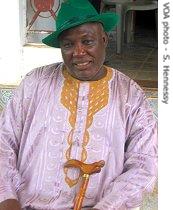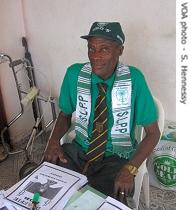-
(单词翻译:双击或拖选)
Freetown
10 August 2007
Opposition1 candidates for the upcoming legislative2 elections in Sierra Leone say the country's traditional rulers, many of whom have openly declared themselves in favor of the ruling party, have used their influence to sway the election unfairly. The rulers, also called paramount3 chiefs, say they are only fulfilling their traditional role, but analysts4 warn that they may be undermining the democratic process. Selah Hennessy reports for VOA from Freetown.
 |
| Parties compete for poster space |
Posters from the National Election Commission tell people to "Vote for the candidates who share your concerns."
Some of the country's traditional chiefs, or paramount chiefs, say they are the ones who should tell the people what those concerns are and to advise them on which candidates will serve them best.
But speaking at a news conference in Freetown earlier this week, Christiana Thorpe, the chief commissioner6 of the National Election Commission, said the paramount chiefs have sometimes overstepped democratic boundaries.
"We have had the challenge of getting them to understand that their authority must not necessarily impinge on the democratic rights of their subjects," she said.
She says most paramount chiefs have not interfered7 with the peoples' rights to choose their favorite candidates, but some have.
"I must say 75 percent of the paramount chiefs are ready to allow their subjects to use their franchise8 [choose by themselves]," she added. "But we do have the 25 percent who I would say are stubborn."
Kamanda Bongay is a local paramount chief in Sierra Leone's second largest city, Bo. He says he will encourage his people to vote for a particular party.
"I think it is important to support a particular political party that I feel will work in the best interests of the people," he explained.
 |
| A paramount chief in the ruling party |
"I will not intimidate9 them, I will not use any language that will intimidate them somehow, they are free to vote for any political party that they would want to," he added.
Fidel Kamara is a Bo resident who comes from the Temne ethnic10 group, which has traditionally supported the leading opposition party.
He says Bongay, who threatened to close down a radio station in 2005 after its commentator11 criticized the ruling Sierra Leone People's Party, harasses12 those who support the opposition.
He says Bongay only allows supporters of the ruling party to use the city's public meeting point, or de barray as it is known in Sierra Leone, for party meetings.
"Whenever another political party wants to use the barray, he says no," said Mr. Kamara.
Sheik Sillah, the Bo district chairman of the leading opposition party, the All People's Congress, says some paramount chiefs are undermining democracy.
"They have the right to join any political party, but they do not have the right to go out openly and campaign for one political party," he said.
Frances Fortune, the West Africa regional director of Search for Common Ground, a non-governmental conflict resolution organization, warns that some paramount chiefs are aggravating13 an already tense political situation in parts of the country.
"But certainly in the south and the east we have seen a lot of political intolerance that is generated and driven by the paramount chiefs," she said.
She says there is a close relationship between the ruling party and the paramount chiefs.
"The SLPP is the ruling party, and they pay the salaries of the paramount chiefs, and so they are their boss," she added. "So how independent can they be?"
 |
| A campaigner works on posters in the paramount chief's office |
"You know, we are into the new millennium14, and Sierra Leoneans are realizing that they are citizens and they have rights," she noted15.
But she adds that paramount chiefs continue to play a vital role in Sierra Leone, carrying the weight of their country's culture on their shoulders.
She says they are important leaders who serve as peacekeepers within communities and can use their influence to bring development to Sierra Leone.
 收听单词发音
收听单词发音
1
opposition

|
|
| n.反对,敌对 | |
参考例句: |
|
|
|
2
legislative

|
|
| n.立法机构,立法权;adj.立法的,有立法权的 | |
参考例句: |
|
|
|
3
paramount

|
|
| a.最重要的,最高权力的 | |
参考例句: |
|
|
|
4
analysts

|
|
| 分析家,化验员( analyst的名词复数 ) | |
参考例句: |
|
|
|
5
adorned

|
|
| [计]被修饰的 | |
参考例句: |
|
|
|
6
commissioner

|
|
| n.(政府厅、局、处等部门)专员,长官,委员 | |
参考例句: |
|
|
|
7
interfered

|
|
| v.干预( interfere的过去式和过去分词 );调停;妨碍;干涉 | |
参考例句: |
|
|
|
8
franchise

|
|
| n.特许,特权,专营权,特许权 | |
参考例句: |
|
|
|
9
intimidate

|
|
| vt.恐吓,威胁 | |
参考例句: |
|
|
|
10
ethnic

|
|
| adj.人种的,种族的,异教徒的 | |
参考例句: |
|
|
|
11
commentator

|
|
| n.注释者,解说者;实况广播评论员 | |
参考例句: |
|
|
|
12
harasses

|
|
| v.侵扰,骚扰( harass的第三人称单数 );不断攻击(敌人) | |
参考例句: |
|
|
|
13
aggravating

|
|
| adj.恼人的,讨厌的 | |
参考例句: |
|
|
|
14
millennium

|
|
| n.一千年,千禧年;太平盛世 | |
参考例句: |
|
|
|
15
noted

|
|
| adj.著名的,知名的 | |
参考例句: |
|
|
|















